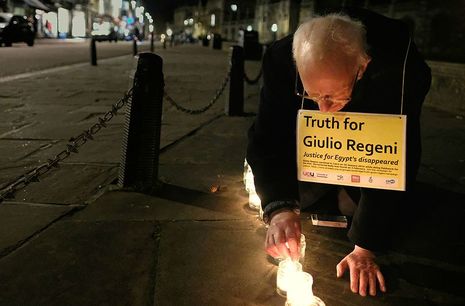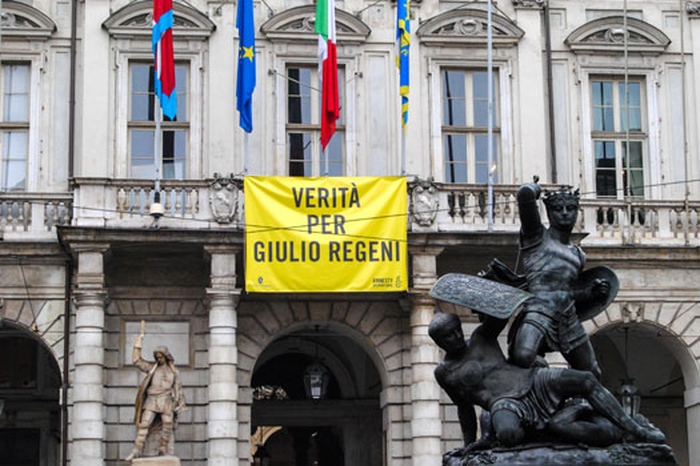Egyptian officials cleared of involvement in Regeni murder
Egypt’s public prosecutor has dismissed the recent indictment of four Egyptian security officials by Italian prosecutors over Regeni’s death, stating that “the perpetrator is unknown”

Content Note: This article contains references to state-enforced “disappearances”
Egypt’s public prosecutor Hamada al-Sawy has cleared four Egyptian security officials of involvement in the murder of former Cambridge doctorate student Giulio Regeni, as of yesterday (30/12).
The security officials – Tariq Saber, Athar Kamel Mohamed Ibrahim, Capt Uhsam Helmi and Maj Magdi Ibrahim Abdelal Sharif – were indicted by Italian prosecutors earlier this month for alleged responsibility in the abduction, torture and murder of Regeni.
Regeni had moved to Cairo in September 2015 to conduct research for a doctoral thesis on independent trade unions, but disappeared on 25th January 2016, and was subsequently found dead nine days later on the outskirts of the Egyptian capital, with his body showing “signs of torture” according to state paper al-Ahram.
Hamada al-Sawy, after clearing the four security officials of charges, asserted that Egypt’s public prosecution does not wish to “pursu[e] a criminal case in the murder, abduction and torture of Giulio Regeni because the perpetrator is unknown.”
An article from Egypt Today (30/12) reports that Egypt’s public prosecution dismissed all charges, brought forward by Italian authorities against the security officials, as “the outcome of wrong deductions that do not align with reason or international criminal standards.”
The article also suggests that the Egyptian public prosecution believes Regeni’s murderer(s) killed him on 25th January 2016 specifically as they would have been aware that “Egyptian security would have been focusing on securing vital institutions”. This date marks the anniversary of the beginning of the 2011 Egyptian Revolution, with suspicions at the time of Regeni’s death speculating that he may have been caught up in a police raid against demonstrators.
However, Italian prosecutors suspect that Egyptian security forces targeted Regeni because of the “politically controversial” nature of his thesis research on independent trade unions.
Meanwhile, a September 2019 report by The Egyptian Commission for Rights and Freedoms, based on five years of research and data collection, claims that Egyptian security forces had “disappeared” 2,723 people since 2015.
The report outlines in its executive summary: “The crime of enforced disappearance remains at the top of the list of violations committed by the Egyptian security authority [...] Despite the continuous demands of the Egyptian authorities for the necessity to stop the use of enforced disappearance against citizens due to its severe negative effects on the disappeared and their families, they do not back down from expanding its use against larger segments of citizens.”
The Egyptian public prosecutor’s decision comes amidst a recent influx of allegations against Regeni’s supervisor, Dr Maha Abdelrahman, which prompted a statement (14/12) defending her on behalf of the University by Vice-Chancellor Stephen Toope.
Dr Abdelrahman has faced criticism for her cooperation with prosecutors over the Regeni investigations: a prominent article written in Italian newspaper La Reppublica from December 2016 attacked her for insincerity during questioning, purporting her to have encouraged Regeni to pursue a research topic with which he was not comfortable, and not communicating the full dangers of undertaking such research to him.
With Egypt dropping its inquiry into Regeni’s murder following the acquittal of its security officials, it is reported that an Italian parliamentary committee will send a delegation to Cambridge before the expiry of its remit at the end of 2021, in order to further question Dr Abdelrahman on an investigative visit.
A spokesperson for the University told Varsity: “The loss of Giulio has had a profound effect on people in Cambridge, in Italy and beyond. We are part of a world-wide community demanding truth and justice for Giulio and his family.”
Varsity has contacted Cambridge University Amnesty International (CUAI) for comment.
 News / Deborah Prentice overtaken as highest-paid Russell Group VC2 February 2026
News / Deborah Prentice overtaken as highest-paid Russell Group VC2 February 2026 Fashion / A guide to Cambridge’s second-hand scene2 February 2026
Fashion / A guide to Cambridge’s second-hand scene2 February 2026 News / Downing Bar dodges college takeover31 January 2026
News / Downing Bar dodges college takeover31 January 2026 Comment / College rivalry should not become college snobbery30 January 2026
Comment / College rivalry should not become college snobbery30 January 2026 Lifestyle / Which Cambridge eatery are you?1 February 2026
Lifestyle / Which Cambridge eatery are you?1 February 2026









